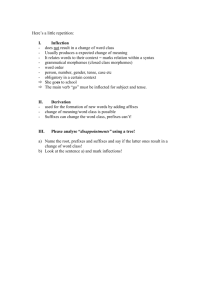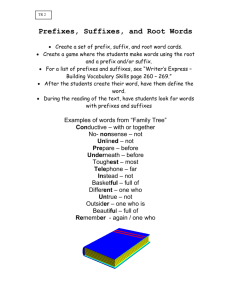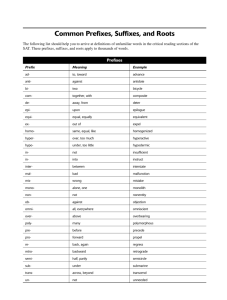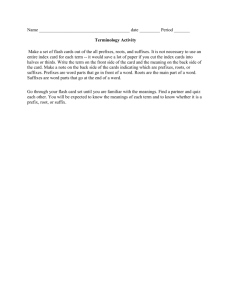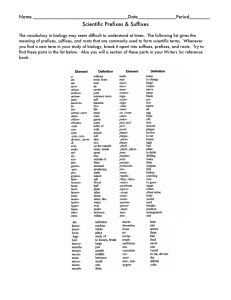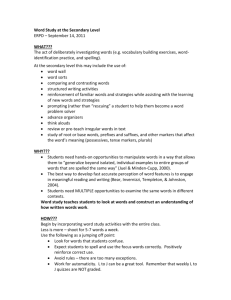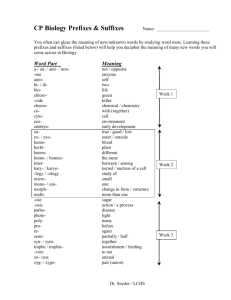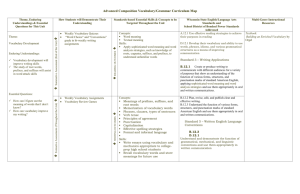EDUC 5658 GB 3 prefixes and suffixes
advertisement
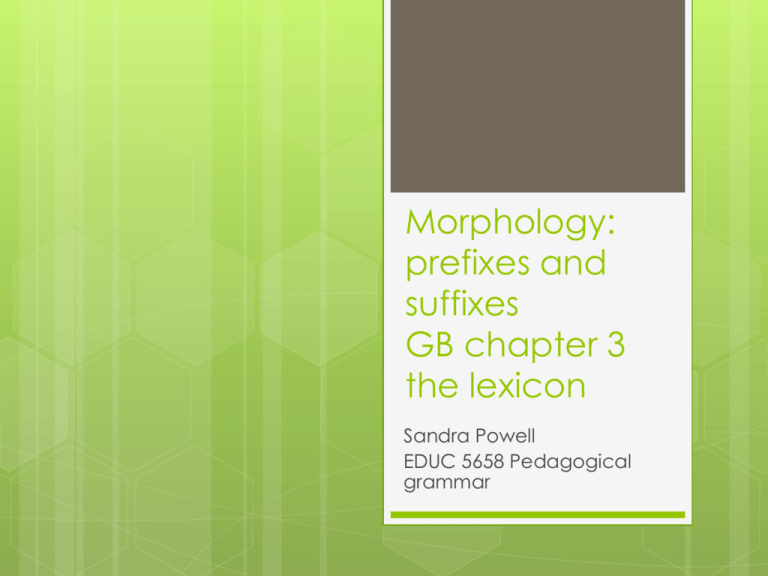
Morphology: prefixes and suffixes GB chapter 3 the lexicon Sandra Powell EDUC 5658 Pedagogical grammar Word forms/ morphology Morphology is study of grammar at the level of the WORD. In English, words can be added in certain patterned ways. on to and changed Word forms/ morphology In English, words can be added on to and changed in certain patterned ways.... We can add PREFIXES to the beginning of a word and SUFFIXES to the end of a word. Modern English does not usually modify the middle parts of words in patterned ways, although Old English did (that is why we have TAKE /TOOK/TAKEN, SHAKE/SHOOK/SHAKEN) Two terms from linguistics that are useful for understanding different ways we use prefixes and suffixes in English Derivation Inflection We can form a new word derived from another word by adding a prefix or suffix. Examples (in English) circle: semi/circul/ar graduate: post/gradua/tion We can vary the forms of words to express grammatical meaning and fit the words into relation with other words. Examples (in English) I like - he like/s Can you ski? – Ski/ing is fun. I fell down while I was ski/ing. My car is old, but Jane has a new car – My car is old/er than Jane/’s car. Why is the difference important for teaching? Learners can’t avoid using inflected forms in SPEAKING and WRITING. They are obligatory; it isn’t possible to avoid S/V agreement, sing/plural, -ing forms of verbs.... Learners need to know derivational prefixes and suffixes for DECODING and UNDERSTANDING new words, but they don’t have to use them immediately. Inflection: I like - he like/s Can you ski? – Ski/ing is fun. I fell down while I was ski/ing. My car is old, but Jane has a new car – My car is old/er than Jane/’s car. Derivation: circle: semi/circul/ar graduate: post/gradua/tion Why is the difference important for teaching? Inflection applies to MOST WORDS in a word class... Inflected forms are predictable. We can teach inflections with RULES and learners can expect that they can apply the same rules when they add new words to their vocabulary. Derivation applies to ONLY SOME words in a word class. It is less predictable. Learners may have to use a dictionary, or ask “is this a word?” when they use derivational prefixes and suffixes to form new words. Inflection: I like - he like/s I sing – she sing/s. I burp – he burp/s. Jane – Jane/’s car. A mother – a mother/’s heart . The university – the university/’s policy Derivation: circle: semi/circul/ar oval: ??? Semi/oval/ar graduate: post/gradua/tion think: ???post/think/tion after/thought Why is the difference important for teaching? Teach inflection... Teach derivational prefixes and suffixes... As patterns and rules (like grammar). As vocabulary (learn meanings of prefixes/suffixes) At phrase and sentence level, not as forms to memorize in a list. For “word attack” skills when trying to understand new words in reading/ listening. Expect all learners to make mistakes with inflections for a long time, and to need lots of practice with using the forms in speaking and writing. Explicit knowledge ≠ implicit knowledge (skill) More for intermediate and higher levels, not beginners. Expect that learners from some language backgrounds will need more work than others with “word attack” and using word forms correctly in sentences. Derivational prefixes and suffixes PREFIXES in modern English usually change the meaning, but not the word class/part of speech, of a word. un/happy (adjective) re/do (verb) over/confident (adjective) mini/bike(noun) SUFFIXES in modern English often change the word class/part of speech of a word. happy (adj) – happiness (n) do (verb) – doable (adj) confident (adj) – confidently (adv) bike (n) - biker (n) (This one doesn’t change the word class, but it changes from a THING to a PERSON) Derivational prefixes and suffixes Because SUFFIXES often change words Because PREFIXES change meaning but have no grammatical effect, you can teach them as vocabulary items, with examples. Important for understanding meaning un/happy (adjective) re/do (verb) over/confident (adjective) mini/bike(noun) from one word class to another, they have an effect on grammar. Speaking/writing: When learners focus on conveying meaning , they may use the most familiar form of the word (lexical not grammatical processing) happy (adj) – happiness (n) ??I found my happy in playing soccer. do (verb) – doable (adj) ?? Sandra, your homework is not can do! Too much homework! confident( adj) – confidently (adv) ?? I want to speak confident. Inflection and inflectional suffixes in English English uses inflection, but much less than many other languages Some languages do not vary the forms of words to express grammatical relationships (Mandarin Chinese is a noninflecting language. In linguistics, this is called an isolating or analytic language) Most inflecting languages have more inflections than English: For example, verb conjugations in French: J’aime, tu aimes, nous aimons, ils aiment, que nous aimions (subjunctive), j’aimais (imperfect), j’aimerai (future).... Many forms! The 8 inflectional suffixes in English Word class Noun Inflection -s Grammatical function Examples Marks plural birds rules (grammatical expression of number) Noun -s (‘s or ‘ in Marks possessor (grammatical written form) expression of case) Jane’s car The car’s tires Adjective -er Marks adjective for use in comparative structures A coyote is smaller than a wolf. Adjective -est Marks adjective for use in superlative structures You say the sweetest things. The 8 inflectional suffixes in English Word class Inflection Grammatical function Examples Verb -ing Marks verb for use in progressive OR use as noun (gerund) I’m studying. Studying is hard work. Verb -ed Marks past tense We celebrated. Everything stopped. Verb -ed Marks verb for use in perfect aspect or passive voice Summer has arrived. A suspect was arrested. Verb -s Marks 3rd person singular verb in present tense: S V agreement That makes me happy. The film starts at 8:05. Do we use these inflectional suffixes with all words in the word class? Word class Inflection Do we use it with all verbs? Examples of exceptions Verb -ing Nearly 100% of verbs have an ??? I am shoulding –ing form. Exceptions: modals study tonight (no (can, must, should, might...) -ing form) Verb -ed (past tense) No. There is a large set of common irregular verbs that have special forms for past tense. Someone stole my Ipad! The sun rose at 5:00 am. Verb -ed (past participle) No. There is a large set of common irregular verbs that have special forms for past participle. Summer has begun. Your sins are forgiven. Verb -s Nearly 100% of verbs. Exceptions: Verbs HAVE and BE (don’t put –s on the base form). Modals. My house has (not haves) a yard. She is (not bes) a teacher. ??? He cans do it. Do we use these inflectional suffixes with all words in the word class? Word class Inflection Do we use it with all nouns? Examples of exceptions Noun -s (plural) A few exceptions: irregular plurals, foreign plurals, some animals Children, teeth, alumni, deer, sheep A large group of nouns classified as uncountable don’t have a plural form Information, luggage, water Yes, but not with pronouns. They have a special form to mark possession. Your turn. I like my house. Noun -s (‘s or ‘ in written form) Do we use these inflectional suffixes with all words in the word class? Word class Inflection Do we use it with all adjectives? Examples of exceptions Adjective -er No. For adjectives longer than 2 syllables and some 2-syllable adjectives, we use the word “more” instead of –er for comparative Tigers are more aggressive than other big cats. You must be more patient. Adjective -est No. The same adjectives that don’t have –er comparatives also don’t have –est superlatives. I chose the most expensive option. Why do learners continue to make mistakes with English inflections even at fairly advanced proficiency? One theory is that, because English doesn’t rely much on inflections to express meaning, learners don’t need to focus on them to understand. They can tune out and not notice the inflections. This slows acquisition. Another theory is that English inflections sound too similar. 3 of the 8 inflections sound exactly the same, though they express different meanings: She smokes, Bart’s book, 3 books 2 of the 8 inflections are –ed for regular verbs: I walked (past tense), I have walked (past participle) Old English (1000 years ago) inflected nouns to express CASE, the relationships between nouns and verbs in a sentence. We still do this in our pronouns but not with nouns.... 1,000 years ago: English was a much more inflected language Remnants of case inflection in the pronoun system in English Pronouns: I like books. Books please me. (different forms for subject and object) This is my book. This book is mine. (different forms for possessive adjective and possessive pronoun) Nouns: That man likes books. Books please that man. (same form for subject and object) This is that man’s book. This book is that man’s. (same form for possessive adjective and possessive pronoun) Why is this information important for teaching? English uses inflection and derivation, but much less than many other languages Learners’ 1st languages have an influence on their acquisition pattern. Learners with isolating/analytic L1s often need more explicit instruction and practice with derivation and inflection. 1000 years ago, English marked case on nouns with inflections Not important for teaching. Learners don’t need to know the history behind the language. Teach pronouns separately from nouns. Tell this as an interesting but not important fact if learners ask why pronouns have so many forms. Should I give my learners a list of the 8 inflectional suffixes? No! A list will not help learners acquire the SKILL of using these inflected forms appropriately. Lists are useful for itemby-item learning (vocabulary) but not for acquiring skill in applying patterns. Should I give my learners a list of some derivational prefixes and suffixes? Maybe, as reference material (like a mini-dictionary or a class vocab. list) The prefixes and suffixes are VOCABULARY. They’re learned item by item. Learners need them to decode meaning , not to apply as rules. Questions about the Powerpoint? I’d be happy to talk grammar with you! Sandra Powell
